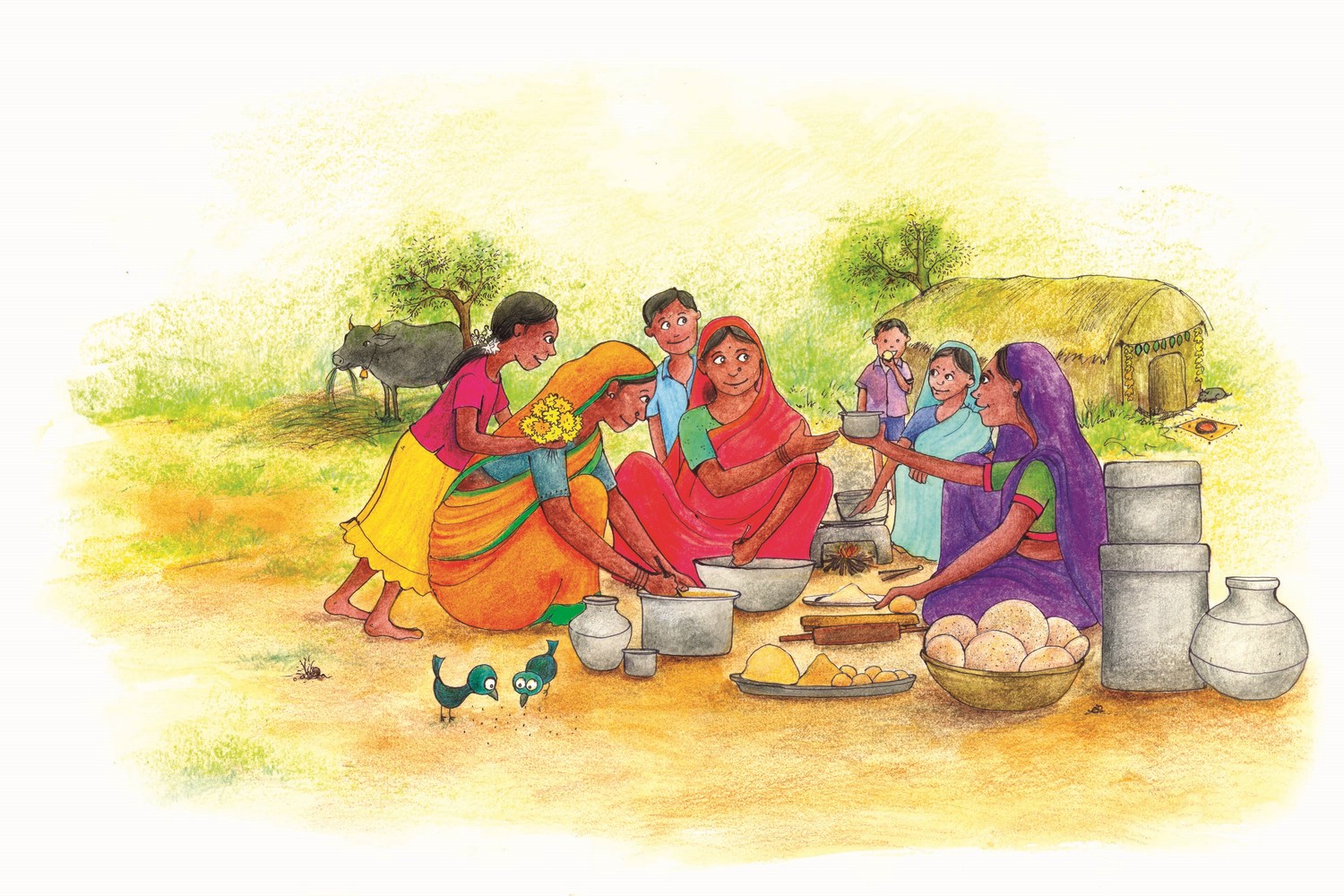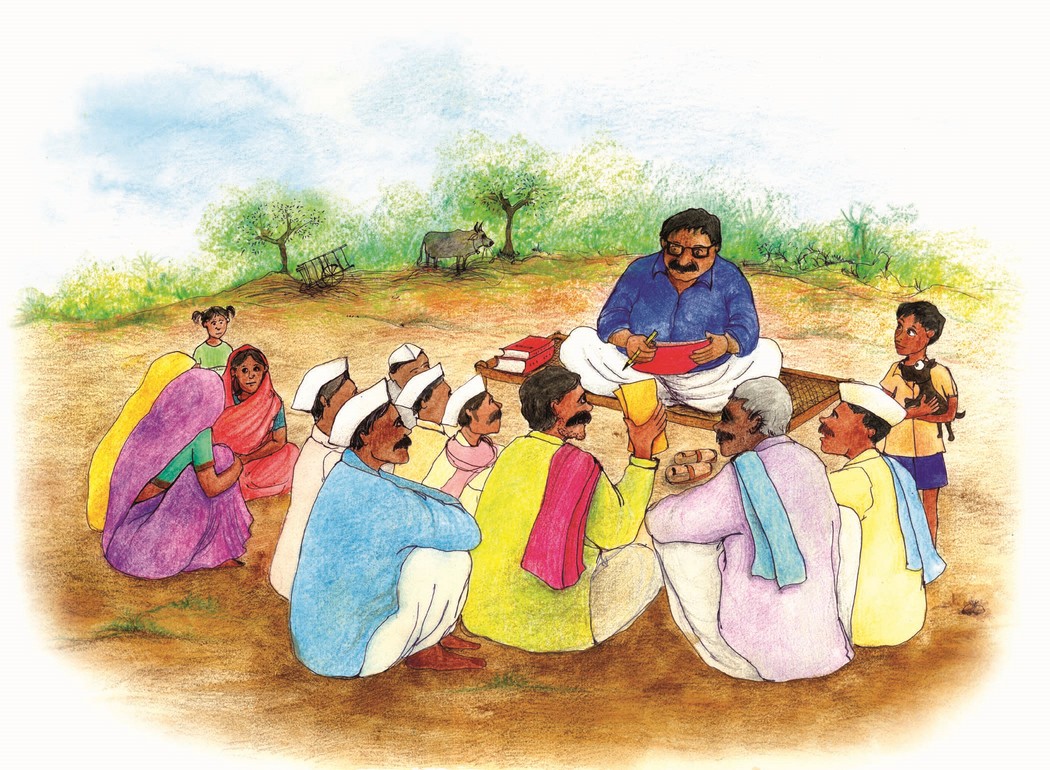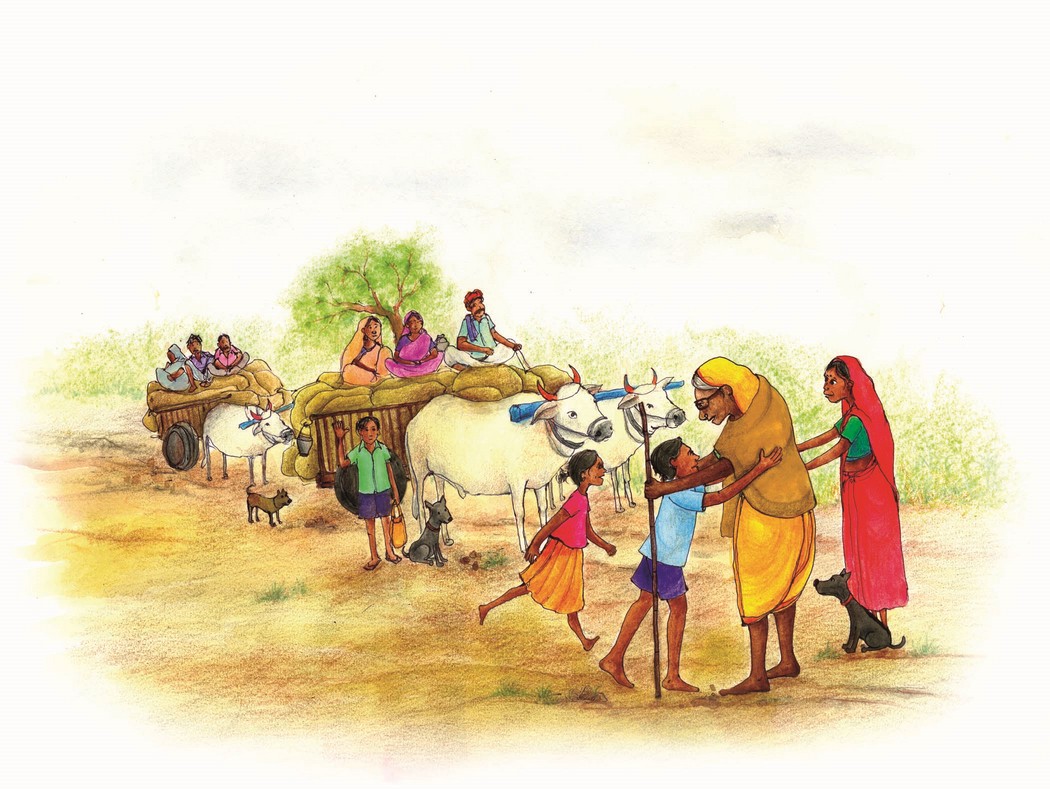Table of Contents
22. On the Move Again
Dhanu’s village
Today all the relatives have come to Dhanu's house to celebrate Dussehra. They have come with their luggage in their bullock-carts. Dhanu's father is the eldest in the family. So all the festivals are celebrated at their house. Dhanu's mother (Aai), the wife of mother's brother (mami) and the wife of father's brother (kaki) are busy making puranpoli (sweet rotis made from jaggery and gram). Alongwith this a spicy kadi dish is also made.
The day passes in laughing and chatting. But by evening everyone's mood changes. The women and children begin to pack their luggage. The men sit down with the mukadam (agent who lends money) for the meeting. The mukadam gives the details of the loan taken by each family.
Then the talks for the next few months begin. The mukadam explains to the villagers in which areas they would go for the next six months. He also gives them some money as loan, for their expenses. Ever since Dhanu remembers, this has been

Teacher’s Notes: Talk in the class about issues related to borrowing money, loans, debts and agents. Try to relate the meaning of these words by taking examples from daily life.
the routine. Families like Dhanu's work on the lands of big farmers till Dussehra, before the rainy season. Many other families also work on such lands. They earn just enough money to keep them going through these months.
But how to manage the remaining six months, when there is no rain, and no work in the fields? So, everyone borrows money from the mukadam. To pay back this money, they have to work for the mukadam Mukadam is an agent for sugarcane factories. He helps them to find work in sugarcane fields.

Tell
- Did all the farmers in Dhanu's village have their own land?
- During what time of the year did Dhanu's family get work in the village? During what time did they not have work?
- Do you know of any families like Dhanu's, who have to leave their villages for months in search of work?
Think and find out
- If people in Dhanu's village did not leave the village in search of work, what difficulties would they face in their own village?
- In Dhanu's village, there can be no farming when there is no rain. Do you think farming can be done even without rain water? How?
Teacher's Notes: Draw children's attention to the fact that sugarcane farming can be done during those months, when there is no rainfall. Discuss various methods of irrigation in the farms, like, tubewells, canals, wheel for water lifting etc. Ask children to draw these. If possible take them or ask them to go with their family to see these.
In the next few months, Dhanu, his parents, his kaka (father's brother) and his two elder children, his mama, mami and their two daughters, and forty-fifty other families from the village will stay away from home. In these six months, Dhanu and many children like him will not be able to go to school. Dhanu's old grandmother, aunt who cannot see, and two-month old cousin sister would stay back in the village.
In other homes too the old and the ill people stay behind. Dhanu misses his grandmother a lot. Dhanu always keeps wondering - who will take care of his grandmother! But, what can Dhanu do?

Think
- Dhanu's family and many others from the village go far away for work but some people stay back in the village. Why does this happen?
- When Dhanu and other children leave the village for six months, what happens in the village school?
- What arrangements are made at your home for old and unwell family members when everyone goes for work?
After Dussehra
The caravan of these families would now settle near the sugarcane fields and sugar factories. For six months they would stay in their huts made of dry sugarcane and its leaves. The men will get up early in the morning and go to cut sugarcanes in the fields. The women and children tie the bundles of sugarcane. Then the bundles are taken to the sugar factory. Dhanu often goes with his father. Sometimes, they spend nights outside the factory on bullock-carts. There, Dhanu plays with the bullocks and wanders around.
Teacher's Notes: You may be very careful and sensitive to deal with children if they wish to share problems related to drug addiction of their family members. The harmful effects of drugs/narcotics may be discussed in the class. Such issues should also be discussed in the inservice training programmes.
At the factory, Dhanu's father gets the sugarcane weighed and takes a receipt (a note to say how much sugarcane they have given). They show this receipt to the agent who then keeps an account of their loan. The agent also gives them some money for the next week's expenses. Then Dhanu's aai and mami take the children to the nearby village market, to buy atta (flour) and oil for the next week. Sometimes mami buys laddoos or some sweets for the children.

She also buys pencils, an eraser and a notebook for Dhanu. After all he is mami's favourite! But Dhanu won't be using these for six months, because he won't be going to school.
Mami wants Dhanu to study and become somebody in life. She does not want Dhanu to move around with his family like this. mama and mami tell Dhanu's parents, "Next time when we leave our village after Dussehra we will leave Dhanu with his dadi and chachi. He will go to school like other children in the village. He should continue his studies. He should study further and become somebody."

Teacher's Notes: It may be possible that children from such families (Drug addicted members) may fall victim to such habits/practices. A timely action needs to be taken to prevent them. On this theme, charts and posters can be prepared by the children with the support of teachers and discuss in the class.
Think and tell
- Why does Mami wish that Dhanu should go to school for the whole year and study?
- What happens when you are not able to go to school for a long time?

Discuss and write
- Dhanu has to go with his village people to other places. Can there be some arrangements during that time so that Dhanu continues his studies? What kind?
- Do you know of any jobs/work for which people have to stay away from their families for many months? Look for examples from this book and write.
- What are the similarities and differences in the lives of different kinds of farmers?
What we have learnt
- You have read about many kinds of farmers in different lessons in this book. Fill the table.
| Name of the farmer | Owns land (✓ or ✕) | What do they grow do they face | What difficulties | Any thing else |
| 1. Damjibhai (Lesson....) | ||||
| 2. Hasmukh (Lesson....) |
